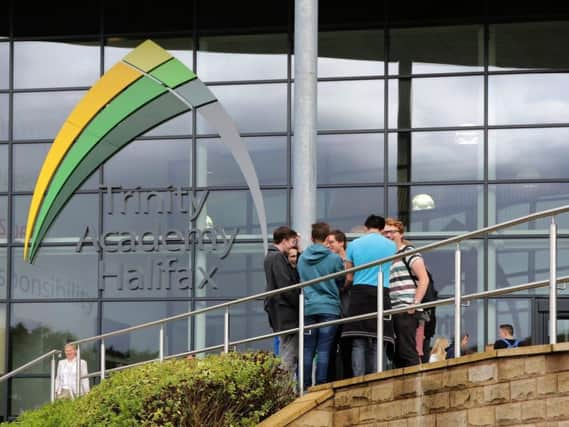School academy trust in Calderdale fails test over women's equal pay


The data from the Equalities Office reveals that two colleges in the region also have gender pay gaps of more than 35 per cent.
They are among around three-quarters of large employers with significant pay disparities, the data shows.
Advertisement
Hide AdAdvertisement
Hide AdFindings from more than 1,000 organisations who have published their gender pay figures online indicate that even though all are “equal pay employers”, many female workers have yet to break through the “glass ceiling” into higher-paid roles.
Based on hourly earnings, 74 per cent of companies admit to paying pay men more than women, while only 15 per cent pay women more.
The Trinity Academy Trust, which runs five schools in the Halifax and Wakefield areas, and the Bradford Diocesan Academies Trust, which operates 13 primaries and secondaries, are the two Yorkshire employers with the biggest gender pay gaps – both 44 per cent.
Another trust, which runs a single school in Pontefract, has a gap of 42 per cent, and two colleges, in Huddersfield and Bradford, have gaps of 35 and 40 per cent.
Advertisement
Hide AdAdvertisement
Hide AdThe Trinity trust said in its Gender Pay Gap report that it was confident that the gap was “not a pay issue” and that it had a “gender neutral” approach to pay.
James Wilson, secretary of the Calderdale National Education Union said: "This report is very disappointing.
"The report shows that the large pay gap is largely concentrated amongst the highest paid senior leaders.
"At classroom teacher level, where there is a transparent and negotiated pay structure, the problem disappears.
Advertisement
Hide AdAdvertisement
Hide Ad"It is also worth noting that Trinity MAT’s board of directors features only two women.
"Trinity’s comment that their pay gap is not an issue, due to what they call a “gender neutral” approach suggests that they do not really understand the nature of the problem.
"Clearly that approach does not work. They must urgently review their recruitment and appointments processes to ensure that they have equality of outcomes.
"Such a review would also be a good opportunity to that their senior leadership teams have fair representation of black and minority ethnic staff, people with disabilities, and LGBT+ staff.
Advertisement
Hide AdAdvertisement
Hide Ad"They are welcome to contact the NEU if they would like any training in Equalities issues."
The Bradford and Trinity trusts said last night that the figures reflected the number of women in lower and junior grades.
Peter Thompson, director of operations at the Bradford Diocesan trust, said: “This is a fairly common position across schools with a significant proportion of women in the workforce, often at the lower end of the pay spectrum in non-teaching posts.”
The Trust’s gender pay report shows that although three-quarters of its workforce is female, “there is a substantial skew in lower-salaried jobs which are historically and predominantly occupied by females”.
Advertisement
Hide AdAdvertisement
Hide AdOnly 12 per cent of workers in its bottom-paid sector were men.
Some public sector organisations have also reported pay gaps, under regulations which make it mandatory for anyone with 250 or more workers to lodge annual figures by April.
Leeds City Council pays women 13 per cent less than men, based on the midpoint of their salary range.
James Lewis, the council’s deputy leader, said: “Nearly a quarter of council staff work in school kitchens or in cleaning roles, and these roles do typically tend to be carried out women, so we recognise that the majority of our lower paid staff are women.”
Advertisement
Hide AdAdvertisement
Hide AdFigures vary across the region, with Scarborough Council paying women 11 per cent more than men, and Harrogate four per cent more.
Commercial firms with a large male-biased pay gap include Tui Airways and easyJet, both with gaps of more than 45 per cent.